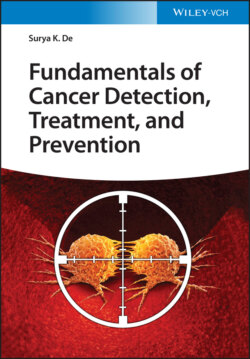Читать книгу Fundamentals of Cancer Detection, Treatment, and Prevention - Surya K. De - Страница 34
1.10 Cancer Screening and Diagnosis
ОглавлениеScreening tests to aid physicians in the detection and diagnosis of cancer fall into one of four general types. Doctors conduct a physical examination to check for signs of any health abnormalities or indicators of disease, such as external lumps or localized pain. A thorough physical exam includes a review of the patient's family history of the disease, health history, and lifestyle factors, all of which may contribute to the development of cancer [15–36].
Laboratory tests, both routine and specialized, consist of an analysis of samples of tissue, blood, urine, or other bodily substances, to check for the presence of certain chemicals, abnormal cells, etc. A variety of imaging procedures are also available to give physicians a look at organs, bones, and other internal body structures. As mentioned earlier, genetic testing can provide information about specific gene mutations (changes) associated with certain types of cancer.
Before undergoing any screening tests, it is important to know the risks involved with the tests themselves, as some cancer screening tests pose more risk than the potential benefit. It should be ascertained whether the screening has actually been proven to reduce the chance of dying from cancer. Bleeding or other problems can result from certain types of screening procedures. For example, screening for colon cancer with sigmoidoscopy or colonoscopy can cause tears in the lining of the colon, leading to internal bleeding.
In addition, cancer screening test results may be abnormal even though there is no cancer present, which is called a false‐positive test result. A false‐positive result causes patient anxiety and usually follow‐up with more tests and procedures, which may have additional risks. On the other hand, test results sometimes indicate no cancer even though the disease is present. A person who receives a false‐negative test result may delay seeking medical care even if there are other abnormal symptoms.
Many screening tests have been shown to detect cancer at an early, more treatable stage and thereby reduce the risk of dying from this disease. The following is a list of a few types of cancer frequently encountered in modern societies, along with tests used to screen for them:
